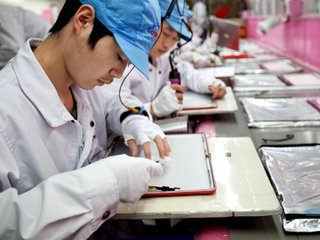Trump rescinds Biden executive order on artificial intelligence
The EO set AI safety and security standards and called for a report on AI's impact on labor
Read more...
You ready to play a game? It’s called “China, Russia, or Florida.” But there’s a catch: everybody loses.
Yet another one of Apple’s suppliers is in the spotlight for labor violations. But there are a couple of twists in this story: 1) the factory in question is producing Apple’s cheap iPhones, and 2) while the factory is in China, the company is headquartered in Florida.
An undercover investigation by China Labor Watch revealed a list of labor violations at a factory in Wuxi China owned by electronics manufacturer Jabil Circuit. The company is headquartered in St. Petersburg, Florida.
The list of offenses includes over 100 hours of monthly mandatory overtime, millions of dollars of unpaid overtime, more than 11 hours of standing work every day with no rest other than 30-minute meal breaks, hiring discrimination, inadequate training and safety training, and more. So basically, it’s the same list of violations that all the other factories have committed, but this time, the workers are building the new iPhone 5C, which is expected to make its debut next week.
“It seems that wherever Apple products are made, labor rights are infringed upon, even if the supplier factory is owned by a U.S.-based company,” the report reads.
The Wuxi factory has over 30,000 employees, and 80% work more than 60 hours a week and 100 overtime hours a month. Like so many other Apple supplier factories, the hourly wage is so low that workers rely on overtime to earn a living wage. The average Jabil Wuxi employee makes the equivalent of $245 a month, while the average monthly income in Wuxi is $472 for private industry employees and $753 for non-private industry employees.
To make matters worse, the average Jabil Wuxi employee works 11 hours of unpaid labor each month by participating in unpaid meetings.
Additionally, meal breaks are shortened by overcrowding and security checkpoints that employees have to deal with on their own time, leaving them just minutes to eat before getting back to work.
Female applicants are required to take pregnancy tests in order to be hired. And overcrowding is a problem, with eight people assigned to one room and night-shift and day-shift workers sharing the same room, which leads to interrupted sleep when workers go in and out of the room.
Workers are required to work overtime and must request approval from their team leaders if they don't wish to work more than eight hours. They have to provide a sufficient reason for why they don't want to work, and if the reason is deemed insufficient, the request is denied. But here's the super awesome kicker: WORKERS ARE REQUIRED TO SIGN A FORM UPON HIRING THAT DECLARES THAT ALL OVERTIME WORKED IS VOLUNTARY. Well played, Jabil.
And of course, each worker's production quota is so high that it's physically impossible to meet without violating Jabil's own standard operation procedures. Example: it takes approximately 42 seconds to polish an iPhone cover, given machine speeds. But the factory has a production quota of 90 pieces per hour per machine. Given the machine speeds, the maximum number a worker can complete is 85, which forces many employees to multitask to complete 90 pieces per hour.
Meanwhile, Jabil generated $17.2 billion in revenue last year with a net income of $3.9 billion. CLW estimates that with each of Jabil Wuxi’s 30,000 employees working an extra 11 hours of unpaid labor, Jabil is effectively stealing $8.3 million from its own workers.
“It is the duty of national governments to regulate the conduct of their companies abroad,” the report reads. “When, for instance, Jabil Circuit does not pay its Chinese production workers for overtime, the U.S. has the obligation to stop it. Rather, the U.S. currently profits through the capital gains tax on earnings Jabil acquires through wage theft of its workers in Wuxi.”
We have reached out to Jabil and Apple for comment, and we’ll update when/if we hear back from them.
Image source: hitechanalogy.com
The EO set AI safety and security standards and called for a report on AI's impact on labor
Read more...The agency also published draft guidance on the use of AI in drug development
Read more...The biggest focus areas for AI investing are healthcare and biotech
Read more...
